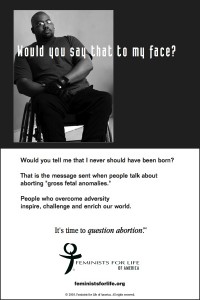In recent decades, America has made many wonderful advances in protecting the rights of people with disabilities and including them in society. Gone are the days of forced sterilization and institutionalization. Now we have laws making disability discrimination illegal and most public places handicap accessible.
Children with special needs are able to get an education in most public school districts and, when one isn’t available or doesn’t meet a child’s specific needs, some states, like Oklahoma, even offer scholarships for those children to attend a private school that will. On top of all that, advancements in medicine and technology are also helping us live longer, more independent lives.
 All that progress, however, is currently being undermined by the now standard practice of killing unborn children diagnosed with various diseases and disabilities. This brilliant poster from Feminists for Life of America (click to enlarge) echoes something I’ve said many times about these “eugenic” abortions.
All that progress, however, is currently being undermined by the now standard practice of killing unborn children diagnosed with various diseases and disabilities. This brilliant poster from Feminists for Life of America (click to enlarge) echoes something I’ve said many times about these “eugenic” abortions.
To be sure, all abortion is equally abhorrent and offensive to humanity. It targets one segment of society, the unborn, and deems it worthy of life only at the behest of another segment. Eugenic abortion, however, goes one step further and takes a class of born citizens, the sick and disabled, and says to us, “your life is not worth living, you are a burden to yourself and society and you, and others like you, are better off dead.”
Whether you mean to say it or not, advocating for abortion for unborn children with various diseases and disabilities in an effort to “spare them a life of suffering” (among other things) suggests that one must be perfect in mind and body in order to have a fulfilling life, which sends a message to those of us poor fools living with disabilities outside the womb that you do not think that our lives are worth living.
It strikes me that the people who have given themselves the privilege of deciding which disabilities are unbearable or “incompatible with life” have little to no first-hand experience with disability themselves. They must not, because the thing is, you’d be hard pressed to find a disabled person who will tell you that they wish they were never born.
Most people with disabilities, even severe ones, are quite happy to be alive and want to stay that way. Children with disabilities are no different. In fact, a recent study from Newcastle University found that disabled children have the same range of happiness and unhappiness as all children.
Unfortunately, despite all the gains we’ve made, non-disabled people still can’t seem to see this. When a prenatal test reveals some disease or disability, they instinctively judge the lives of these children through able-bodied eyes and only see tragedy.
Consider another poll here in America a few years ago which found that 52% of Americans say that they would rather be dead than disabled. Going back to the Newcastle study, even many parents who have chosen to love and care for their disabled child scored their children’s quality of life much lower than the children themselves.
By killing unborn children with disabilities, you might think that you are sparing someone a miserable life, but what you’re really doing is projecting onto them your own fear of hardship and suffering.
Understandably, every expecting parent wants their child to be born healthy. Unfortunately, sometimes it doesn’t work out that way, but that doesn’t make their life less valuable, or your life with them less joyful. Everyone has the right to pursue happiness, including children with disabilities, and the good news is that most of them will enjoy their lives immensely…if they’re given the opportunity.
Be not afraid. Often the prospect of life with a disability or a disabled child is seen as an act of heroism that people either think they don’t have the strength for themselves or aren’t comfortable asking someone else to undertake. Words like “burden” and “cope” are frequently used, but the reality for those of us who live it, is that life with a disability is quite ordinary. It’s different. It has some challenges. But it’s certainly not too hard to handle.
For more discussion on the unethical uses of prenatal genetic testing please check out the first episode of my new pro-life video series BioTalk. It is important to understand that prenatal genetic testing is not wrong in and of itself. Quite the contrary.
Diagnostic testing for genetic diseases has great potential for good. For example, today prenatal surgery is available for children diagnosed with spina bifida in the womb, to help the most serious complications of the worst form of the disease. Similar corrective treatment may even be available for unborn children with Down syndrome someday. Recently, researchers at the University of Washington announced a major step forward in the treatment the genetic disease.
Humanity’s greatness is shown best in how we love and care for those in need. Death is not medicine. Killing is not care. We should be concerned with finding cures and making the world a place where people with disabilities feel welcome and valued, not trying to snuff them out of existence.



